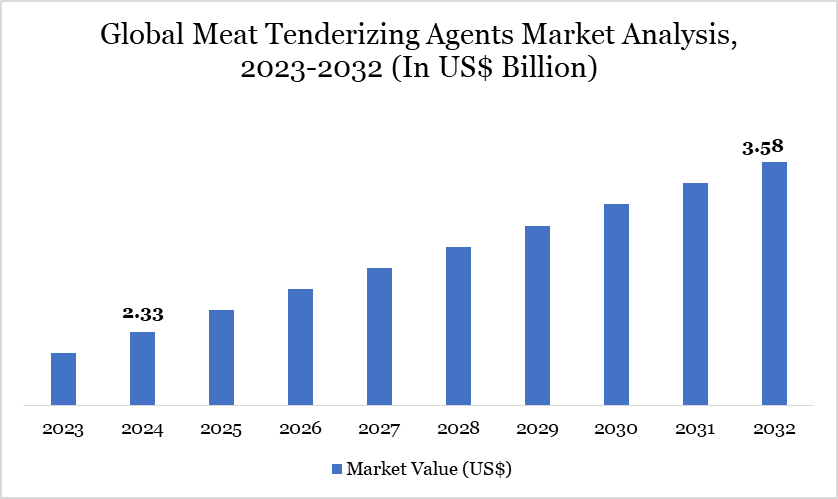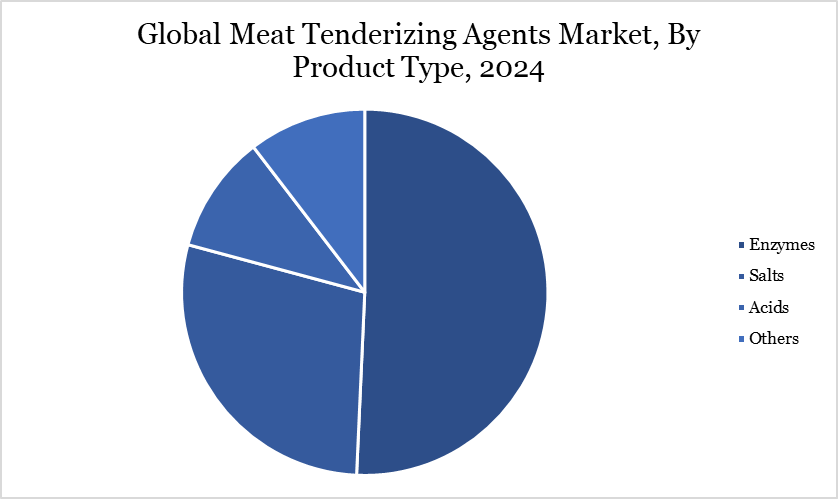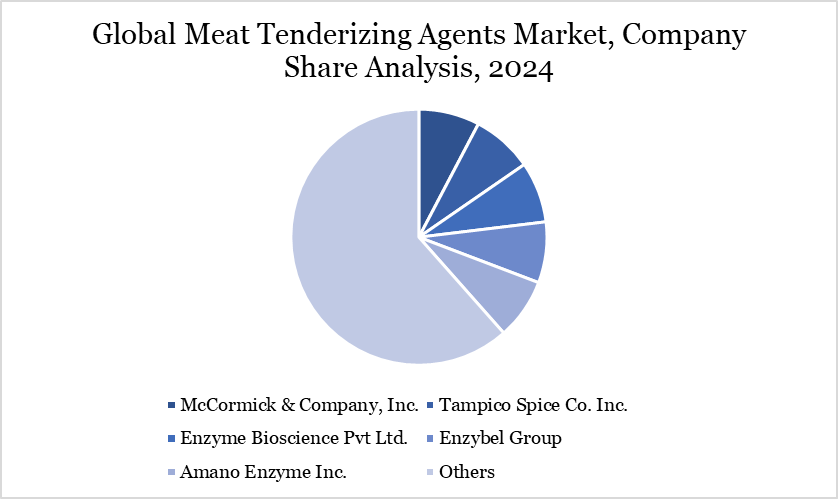Meat Tenderizing Agents Market Size
Meat Tenderizing Agents Market size reached US$ 2.33 billion in 2024 and is expected to reach US$ 3.58 billion by 2032, growing with a CAGR of 5.55% during the forecast period 2025-2032.
The meat tenderizing agents market is experiencing significant growth, driven by the increasing global demand for processed meat products. This surge in processed meat exports reflects a growing consumer preference for convenient, ready-to-eat meat products. The popularity of such products necessitates the use of meat tenderizing agents to enhance texture and palatability, thereby driving market growth.
Government initiatives have further supported this trend. The Ministry of Food Processing Industries (MoFPI) has approved various projects under schemes like the Pradhan Mantri Kisan Sampada Yojana (PMKSY) and the Production Linked Incentive Scheme for Food Processing Industry (PLISFPI), aiming to boost the production and export of processed foods. These efforts have contributed to processed foods accounting for 27% of India's agricultural exports, up from 14% a decade ago. As the demand for processed meat products continues to rise, the need for effective meat tenderizing agents becomes increasingly vital to meet consumer expectations.
Meat Tenderizing Agents Market Trend
A notable trend in the meat tenderizing agents market is the shift towards natural and clean-label ingredients. Consumers are increasingly seeking products with minimal additives and preservatives, prompting manufacturers to adopt natural enzymes like papain and bromelain as alternatives to synthetic tenderizers. This move aligns with the broader clean-label movement in the food industry, where transparency and natural ingredients are prioritized.
Additionally, advancements in food processing technologies are enabling more efficient use of meat, reducing waste and improving sustainability in the industry. These developments reflect a growing consumer preference for healthier and more environmentally friendly food options, influencing the evolution of the meat tenderizing agents market.

For more details on this report – Request for Sample
Market Scope
| Metrics | Details |
| By Product Type | Enzymes, Salts, Acids, Others |
| By Meat Tenderizing Agents | Papain, Bromelain, Proteases, Acids, Others |
| By Source | Plants, Animals, Microorganisms, Others |
| By Form | Dry, Liquid |
| By Application | Ready to cook Meat, Marinades, Others |
| By Region | North America, South America, Europe, Asia-Pacific and Middle East and Africa |
| Report Insights Covered | Competitive Landscape Analysis, Company Profile Analysis, Market Size, Share, Growth |
Meat Tenderizing Agents Market Dynamics
Popularity of Processed Meat Products
The increasing demand for processed meat products is significantly influencing the meat tenderizing agents market. In the 2023–24 financial year, India's exports of processed meat reached 813.72 metric tons, valued at approximately US$ 2.48 million, with major export destinations including Vietnam, Bhutan, Qatar, UAE, Korea, and Hong Kong. This surge in processed meat exports reflects a growing consumer preference for convenient, ready-to-eat meat products. The popularity of such products necessitates the use of meat tenderizing agents to enhance texture and palatability, thereby driving market growth.
Government initiatives have further supported this trend. The Ministry of Food Processing Industries (MoFPI) has approved various projects under schemes like the Pradhan Mantri Kisan Sampada Yojana (PMKSY) and the Production Linked Incentive Scheme for Food Processing Industry (PLISFPI), aiming to boost the production and export of processed foods. These efforts have contributed to processed foods accounting for 27% of India's agricultural exports, up from 14% a decade ago. As the demand for processed meat products continues to rise, the need for effective meat tenderizing agents becomes increasingly vital to meet consumer expectations.
Rise of Natural Tenderizing Alternatives
As consumers become more health-conscious, there is a growing preference for products with natural ingredients over synthetic additives. This shift is leading to a decline in demand for traditional meat tenderizing agents, which may be perceived as artificial. Consequently, the meat tenderizing agents market is facing pressure as consumers opt for natural tenderizers such as fruits (like pineapple and papaya) or natural enzymes.
As the market for natural tenderizing alternatives expands, it creates competition for traditional meat tenderizing agents. Brands that promote natural tenderizing methods may attract consumers away from conventional products, negatively impacting the meat tenderizing agents market. The growing emphasis on sustainability in food production is driving interest in natural tenderizing alternatives, which are often derived from renewable sources. Consumers are increasingly looking for sustainable options, leading to a decline in the demand for synthetic tenderizers in the meat tenderizing agents market.
Meat Tenderizing Agents Market Segment Analysis
The global meat tenderizing agents market is segmented based on product type, meat tenderizing agents, source, form, application and region.

Enzymes Segment Driving Meat Tenderizing Agents Market
Enzymes, especially plant-derived proteases like papain and bromelain, hold over 30% of the meat tenderizing agents market, enhancing meat tenderness by breaking down muscle proteins. The USDA supports natural enzymes due to their safety and effectiveness in food processing. Rising consumer demand for clean-label and natural products fuels enzyme-based tenderizers’ growth. Emerging enzymes like zingibain from ginger show even greater potential for improving meat texture. This enzyme focus is a key driver in advancing the meat tenderizing agents market.
Meat Tenderizing Agents Market Geographical Share
Demand for Meat Tenderizing Agents in North America
US meat tenderizer industry growth is driven by increased consumer interest in home cooking and grilling, leading to a higher demand for products that enhance meat tenderness. This trend underscores the rising preference for convenient, ready-to-cook meat products that often utilize tenderizing agents to improve texture and taste.
The US Department of Agriculture (USDA) has recognized the importance of enhancing meat processing capabilities to meet growing demand. In July 2021, the USDA announced a US$ 500 million investment to expand meat and poultry processing capacity, aiming to increase competition and improve market access for American farmers.
The initiative is expected to bolster the availability of processed meat products, further driving the need for effective meat tenderizing agents. As consumer preferences continue to evolve towards high-quality, tender meat, the meat tenderizing agents market in North America is poised for sustained growth.
Sustainability Analysis
The meat tenderizing agents market is increasingly adopting sustainable practices by favoring natural enzymes like bromelain from pineapples, reducing reliance on synthetic chemicals and lowering environmental impact. Producers are implementing closed-loop systems to recycle water and energy, minimizing resource waste.
There's a shift toward biodegradable and recyclable packaging materials, aligning with eco-friendly consumer demands. Transparency in sourcing and sustainable supply chain management is becoming a priority. These efforts collectively support reduced carbon footprints and promote greener meat processing methods.
Meat Tenderizing Agents Market Major Players
The major global players in the market include McCormick & Company, Inc., Tampico Spice Co. Inc., Enzyme Bioscience Pvt Ltd., Enzybel Group, Amano Enzyme Inc., The Basque Company, Enzyme Development Corporation, Atlantic Spice Company, Spice Madness LLC, and Green Land Food, LLC.

Key Developments
On September 28, 2023, Novozymes launched a groundbreaking product designed to revolutionize the plant-based meat industry by enhancing texture and simplifying ingredient lists in meat alternatives. Vertera ProBite, a natural enzyme, transforms plant proteins into fibrous structures that closely replicate the mouthfeel and bite of animal meat.
Why Choose DataM?
Data-Driven Insights: Dive into detailed analyses with granular insights such as pricing, market shares and value chain evaluations, enriched by interviews with industry leaders and disruptors.
Post-Purchase Support and Expert Analyst Consultations: As a valued client, gain direct access to our expert analysts for personalized advice and strategic guidance, tailored to your specific needs and challenges.
White Papers and Case Studies: Benefit quarterly from our in-depth studies related to your purchased titles, tailored to refine your operational and marketing strategies for maximum impact.
Annual Updates on Purchased Reports: As an existing customer, enjoy the privilege of annual updates to your reports, ensuring you stay abreast of the latest market insights and technological advancements. Terms and conditions apply.
Specialized Focus on Emerging Markets: DataM differentiates itself by delivering in-depth, specialized insights specifically for emerging markets, rather than offering generalized geographic overviews. This approach equips our clients with a nuanced understanding and actionable intelligence that are essential for navigating and succeeding in high-growth regions.
Value of DataM Reports: Our reports offer specialized insights tailored to the latest trends and specific business inquiries. This personalized approach provides a deeper, strategic perspective, ensuring you receive the precise information necessary to make informed decisions. These insights complement and go beyond what is typically available in generic databases.
Target Audience 2024
Manufacturers/ Buyers
Industry Investors/Investment Bankers
Research Professionals
Emerging Companies
